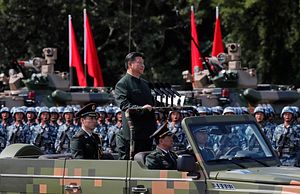August 1 is Army Day in China, the day that celebrates the founding of the People’s Liberation Army (PLA) in 1927. Twenty-two years later, the PLA was victorious in expelling Chiang Kai-shek’s Nationalist forces from mainland China, giving Mao Zedong the power to proclaim the establishment of the People’s Republic of China.
Army Day this year was notable because it highlights two domestic tests of top leader Xi Jinping’s consolidation of power.
First, Xi is challenging the remaining financial interests of one of China’s most powerful economic drivers over the last three decades: the Chinese military and paramilitary. Many of those interests are vested in people who share Xi’s privileged revolutionary background. As the son of a revolutionary PLA hero, on this issue he challenges much of his own class and power base.
Second, Xi is being challenged by the rank and file of that same PLA, who want better material rewards for their military contributions. In this case, he is being challenged by the very men and women who made his class and power base possible.
The Business of the Army
Xi, who holds the triumvirate of the highest posts in China as president of the country, general secretary of the Chinese Communist Party, and chairman of China’s Central Military Commission, proclaimed on July 31 that “the military is expected to stop all its commercial activities by the end of the year.” One would think that, with Xi’s power, a statement like that would make it as good as done.
But according to the China Daily and other sources, one day before Army Day, Xi said that although the military has already made “major progress” in ceasing its commercial activities, nonetheless “the tasks at hand are still arduous and heavy.” Xi admitted that there are “many complicated factors” which relate to halting the Chinese military’s commercial activities.
Are Xi’s comments highlighting the difficulty of this task actually precursor excuses for not being able to complete the job? It wouldn’t be the first time.
Talk about shutting the PLA out of money-making enterprises has been going on since the 1990s. Prior to that, paramount leader and reformer Deng Xiaoping had actually encouraged the PLA to continue operating and expanding for-profit business operations that had begun, in many cases, prior to Deng’s reforms.
Needless to say, this kind of sanction from the most powerful man in China, in a country with little legal framework and less enforcement, was a license to pursue limitless riches.
Both the PLA and its rather dreaded counterpart, the paramilitary People’s Armed Police (PAP), were subsequently able to enrich themselves and their power brokers with Party-sanctioned financial ownership and participation in everything from arms, satellites, and telecommunications equipment to hospitals, consumer goods, mining, and karaoke clubs barely disguising the “escort” services available within.
Real estate was never a problem for either the PLA or the PAP. Sons and daughters of PLA grand marshals and generals who had served with Mao were to be found driving down streets in central Beijing, quietly but effectively requisitioning parcels of land for their own military-tied companies.
Shenyang, it was rumored (supported by visual evidence at the time), was an automobile smuggling hub, run by groups tied to the military and paramilitary.
Hotels such as the Kunlun in Beijing were openly owned and run by the army. Enterprising sons and daughters of military leaders found their way abroad and established PLA-owned business subsidiaries in multiple industries.
Then, in 1998, Jiang Zemin ordered the PLA and the PAP to cease all business activities, and followed up, to the surprise of most, with strong and somewhat effective measures to make it happen.
But now, two decades later, the man who is supposedly the strongest Chinese leader since Mao Zedong is still trying to finish the job. It will be a test of Xi’s power to see if he is able to.
Veteran Affairs
Xi’s second problem comes from the underprivileged class of veterans, 57 million strong, who have been active and vocal in recent months, protesting for better health care, pensions, and jobs. At a time when the PLA is offering significant financial incentives for China’s best and brightest to enter the military, the rank-and-file veterans who came into the PLA from largely poor and poorly-educated backgrounds now feel themselves forgotten by the Party they ushered in and supported, as is well-documented in Eugene K. Chow’s May article in The Diplomat.
This is equally, if not even more, dangerous territory for Xi. As Minnie Chan reported in the South China Morning Post, the vice minister of the newly-minted Ministry of Veterans Affairs, Fang Yongxiang, warned veterans not to use Army Day as a platform for their protests.
Such words, and the often violent reaction by local authorities toward veterans’ rallies in recent months, are a far cry from the reverence once expressed for the PLA by ordinary Chinese citizens. To be sure, the PLA’s role in the killings of protesters and other citizens in Beijing on June 4, 1989, greatly tarnished its reputation in the capital. In the provinces, however, where the story was able to be better spun by state media, the PLA never lost that degree of respect. With ordinary soldiers protesting in the streets, Xi has a structural concern on his hands that could seriously damage him.
As Xi meets challenges from abroad, such as trade, tariffs, and accusations of technology theft, he also faces enormous challenges from within. Army Day is a stark reminder of the fount of Xi Jinping’s power, and his debt to it.

































